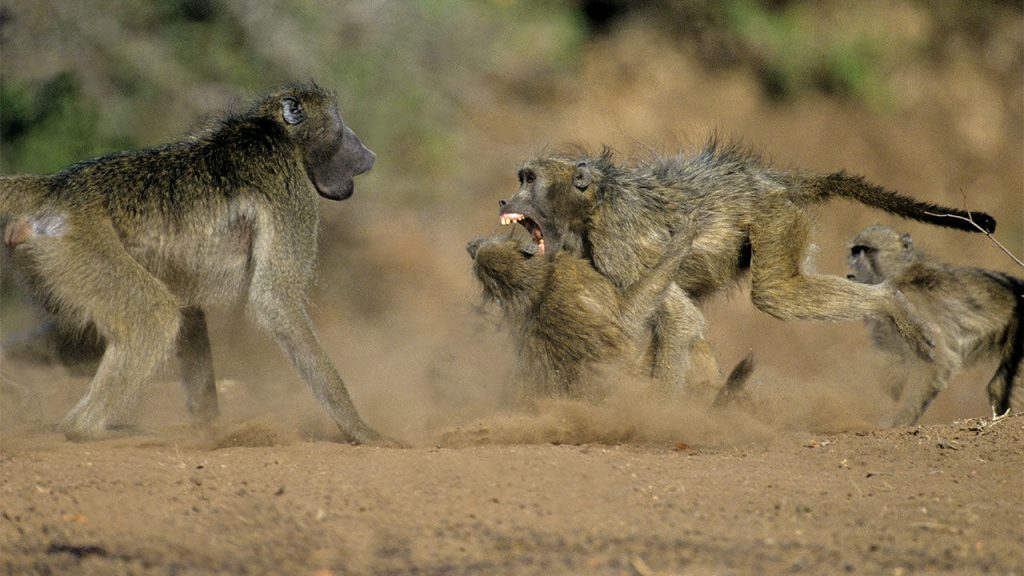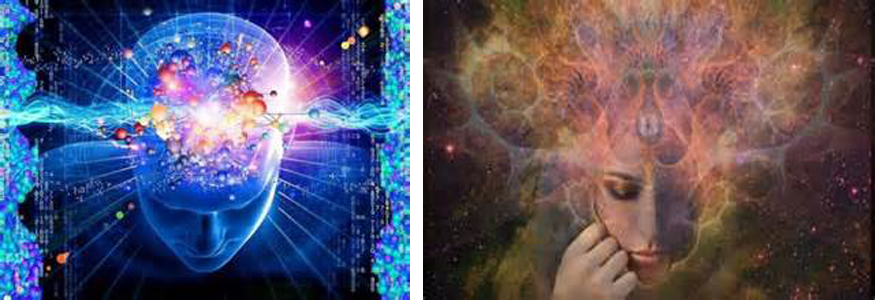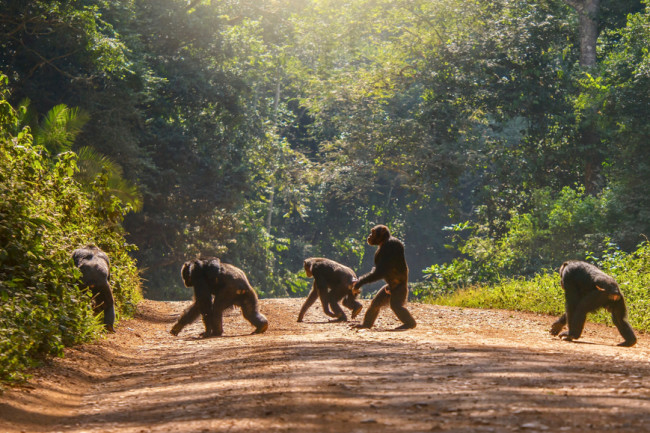Scientists have pinpointed a few of the differences in the 1% of DNA we do not share with our closest primate cousins—chimpanzees and bonobos. They appear to be “accelerated evolutionary changes” in genes associated with speech, hearing and brain development.
For example, there is evidence that hearing in humans was “specially tuned by natural selection to make possible the elaborate spoken language capability unique to humanity.”
In terms of aggression and war however, humans and some species of chimps (bonobos have pacific and loving natures) may not be very different at all. So it’s doubtful that teasing out tiny genetic differences will ever give us a better understanding of ourselves.

Primatologists have observed certain species of chimpanzees engaging in planned hunting of other primates–smaller and not as smart rhesus monkeys. Jane Goodall has also observed, to her horror, the systematic extermination of one group of chimps by a rival group.
So what exactly makes humans different from other animals? Indulging in a tautology, I’m tempted to say that what separates us from chimps is separating ourselves from chimps, and everything else. But that just begs the question, what makes us so destructive as a species?
We’re able to consciously manipulate our environment by removing ‘things’ from the ecological mesh, but like the Sorcerer’s Apprentice, we cannot stop, and so are fragmenting the Earth all to hell. We’re able to study things scientifically by standing apart from them, but we’re unable to wisely, justly and sustainably apply our exponentially increasing body of knowledge.
Is it because we are only able to know ourselves when we end the ancient habit of separation? Whenever one says, ‘I think,’ or ‘I feel,’ with emphasis on I, there is separation.
There is something inherently anthropocentric in seeking to find “the essence that makes us human.” The phrase contains the idea embedded within it that the power humans wield over other animals somehow makes us special. Given what we’re doing to the planet, it could mean just the opposite.
The cheesy series of “Planet of the Apes” movies did have one interesting idea. The basic premise was that if other apes were as smart as us, they would be just as ruthless and speciesist as humans are. If Goodall’s observations, which were made after “Planet of the Apes” came out, are any indication, that idea has legs.
This raises another question: Given the right conditions and enough time, does nature inexorably produce consciously thinking species that proceed to foul and denude their planets as they accrue science and technology? Or are humans just an especially incorrigible thought-bearing species?
As a person who has had so-called mystical experiences since I was 17, I see another dimension to this debate. When the brain is completely quiet in unforced, unwilled attention, there is awareness of what can only be called sacredness.
It isn’t God-as-deity, but an unknowable essence that permeates the universe. Time and space, matter and energy are seen and felt as an undivided movement in wholeness, with compassion intrinsic to the universe.
I feel no need to convince anyone of the existence of this sacredness, even if there was a way I could say anything more about it, which there isn’t. But it’s a great curiosity to me that the human brain, which is tearing everything apart, is also capable of being consciously aware of an essence beyond thought and knowledge.

Perhaps that defines the “riddle of man,” which each of us must resolve in our own hearts. Perhaps a brain capable of conscious thought, whose basic principles are separation and manipulation, is a prerequisite for awakened consciousness. The very big bump in the road to realizing our potential as a species, however, is the tendency of creatures possessing the powerful gift of ‘higher thought’ to totally fragment its planet and itself.
There are other, deeply implicit questions: Is the pressure on us for transmutation, as individuals and a species, growing in direct proportion to our plundering of the planet? Is this global pandemic a real-time driver of transmutation?
In other words, are “accelerated evolutionary changes” happening, or are we entering the sum of all dark ages?
Martin LeFevre lefevremartin77 at gmail.com

